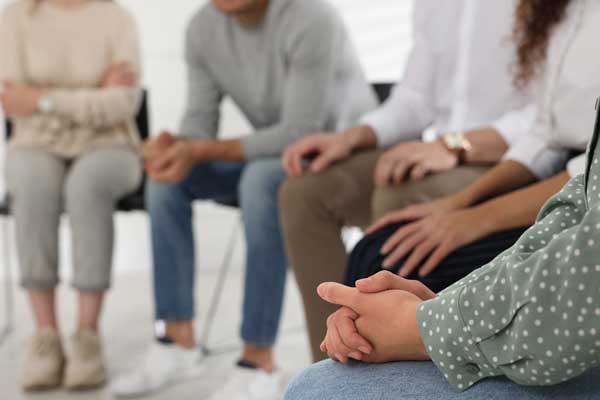Group Outpatient Trauma and PTSD Therapy
Liberty Place
313 West Liberty Street, Ste. 224
Lancaster, PA 17603
Tel. 717-394-3994Fax: (717) 394-0124email: acrs@advanced-counseling.com

Group Outpatient Trauma and PTSD Treatment Overview
- You join a structured group setting to share your experiences, learn from one another, and receive support. This type of treatment can be particularly beneficial if you feel isolated in their experiences, as it fosters a sense of community and shared understanding.
- Can be a powerful tool for healing, providing you with a supportive community and valuable resources for recovery. By participating in a group, you can share their experiences, learn from others, and develop coping strategies in a safe and structured environment. If you or someone you know is considering group therapy for trauma, contact the Trauma Treatment professionals at Advanced Counseling and Research Services today.
Key Components of Group Outpatient Trauma and PTSD Therapy
Facilitated Group Sessions: Group sessions are typically led by a trained mental health professional who guides discussions, provides psychoeducation, and facilitates therapeutic activities. The facilitator ensures a safe and supportive environment for all participants.
Shared Experiences: Participants have the opportunity to share their Trauma stories and experiences, which can help normalize your feelings and reduce feelings of isolation. Hearing others’ stories can also give you new perspectives and insights.
Psychoeducation: Groups often include educational components that help you understand trauma, its effects, and the healing process. This may cover topics such as the impact of Trauma on mental health, coping strategies, and self-care techniques.
Skill Development: Group therapy often focuses on teaching you coping skills, emotional regulation techniques, and mindfulness practices. You may engage in exercises that promote relaxation, stress management, and resilience.
Support and Validation: One of the primary benefits of group therapy is the support and validation you receive from one another. Sharing in a group can help you feel understood and less alone in your struggles.
Structured Activities: Group sessions may include structured activities such as guided discussions, role-playing, art therapy, or mindfulness exercises. These activities can help you process your Trauma in creative and engaging ways.
Goal Setting: You may work together to set group goals or individual goals within the group context. This can help you create a sense of purpose and direction in the healing process.
Confidentiality and Safety: Confidentiality is emphasized in group settings to create a safe space for sharing. You are encouraged to respect each other’s privacy and maintain a non-judgmental atmosphere.
Benefits of Group Outpatient Trauma and PTSD Treatment
Community and Connection: Group therapy fosters a sense of belonging and connection, which can be particularly healing for people who have experienced trauma.
Diverse Perspectives: Hearing different viewpoints and coping strategies from peers can give you new insights and approaches to healing.
Cost-Effectiveness: Group therapy can be a more affordable option compared to individual therapy, making it accessible to more individuals.
Enhanced Communication Skills: Participating in group discussions can help you improve your communication and interpersonal skills, which can be beneficial in other areas of life.
Considerations Group Dynamics: The effectiveness of group therapy can depend on the dynamics of the group, including the level of trust, openness, and support among participants.
Facilitator Experience: It’s important that the group is led by a qualified mental health professional experienced in Trauma-Informed care and group dynamics.
Comfort Level: You may feel uncomfortable sharing in a group setting, especially at first. It’s important for you to feel safe and to go at your own pace.
Types of Trauma and PTSD Groups
Support Groups: These groups provide emotional support and sharing experiences without a structured therapeutic approach.
Therapeutic Groups: Led by a mental health professional, these groups incorporate therapeutic techniques and structured activities aimed at healing.
Psychoeducational Groups: These groups focus primarily on educating participants about Trauma and coping strategies, often with less emphasis on sharing personal experiences.
Current Groups
Dialectical Behavior Therapy (DBT) Skills Group

- Our DBT Group is structured to teach important concepts and skills.
- This group will be open to both male and female identifying adults (18 and older).
- Group will be one hour sessions every other Thursday from 3:00PM - 4:00PM EST beginning 9/4/25 through 12/11/25 and will run for 7 sessions.
- Course Content by Week:
- Week 1 - DBT House and Assumptions
- Week 2 - Mindfulness: Core Skills
- Week 3 - IE: Dialectics
- Week 4 - Biosocial Theory
- Week 5 - Emotion Regulation: Opposite Action
- Week 6 - Distress Tolerance: Radical Acceptance/Willingness
- Week 7 - Behavioral Chain Analysis
Disclaimer: This is a general description. For specific details and to determine if these groups are right for you, please contact us or call 717-394-3994.
Most major insurance is accepted; check with your carrier to see if group coverage is available.
Cheryl Wilson-Smith
Chief Executive Officer
Cheryl has the academic and extensive experience to help you by providing the highest quality Group Trauma Therapy.

- Licensed Professional Counselor (LPC);
- Pa. Lic. PC006514
- Fl. Lic. TPMC1044
- Certified Traumatologist (CT)
- National Certified Counselor (NCC)
- Certified Clinical Mental Health Counselor (CCMHC)
- Certified Clinical Trauma Professional (CCTP)
- Certified in Emergency Crisis Response (CECR)
- Neuropsychotherapist Certified (NPT-C)
- Master of Arts (MA)
- 20+ years of clinical experience.
- Worked with clients across the lifespan.

